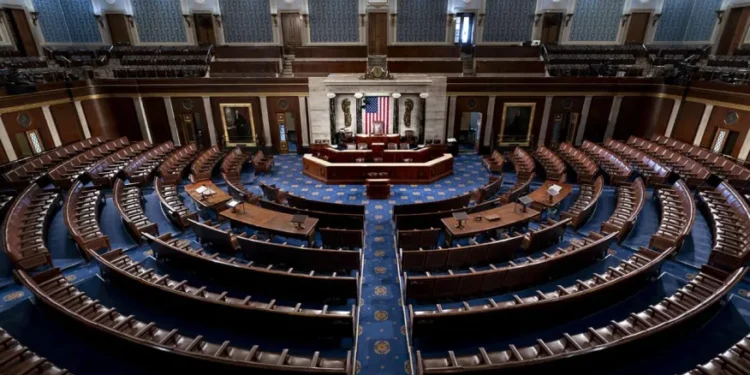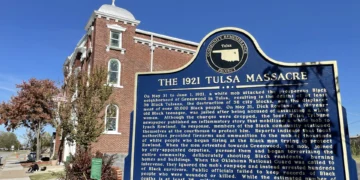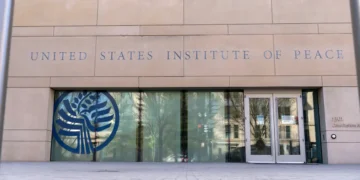May 22, 2025 Story by: Publisher
The U.S. House of Representatives has advanced the “One Big Beautiful Bill,” a sweeping reconciliation package that has drawn sharp criticism from civil rights leaders, education advocates, and budget analysts.
While proponents claim the bill will boost economic growth through tax reform and entitlement restructuring, the proposed policies could have severe consequences for African American communities—particularly in education and access to economic mobility.
“Children will get hurt. Women will get hurt,” House Minority Leader Hakeem Jeffries said. “Older Americans who rely on Medicaid for nursing home care and for home care will get hurt. People with disabilities who rely on Medicaid to survive will get hurt. Hospitals in your districts will close. Nursing homes will shut down. People will die. That’s not hype. That’s not hyperbole. That’s not a hypothetical.”
The final vote was 215-214.
Key takeaways from House GOP Reconciliation Bill
- Cuts Medicaid by $700 Billion
- Cuts Medicare by $500 Billion
- Cuts SNAP benefits by $300 Billion
- Contains $3.8 Trillion in tax cuts
- Increases debt by more than $3 Trillion over 10 years
Economic Disparities Deepen
Tax Benefits Favoring Higher-Income Individuals
The bill proposes making permanent the tax cuts introduced in 2017, which primarily benefit higher-income earners. According to the Congressional Budget Office (CBO), the top 10% of earners would see a 2% increase in their financial resources by 2033, while the bottom 10% would experience a 4% reduction. These reductions encompass both cash income and the value of government aid, such as Medicaid and SNAP (food assistance).
Work Requirement for Medicaid
The bill includes several proposed changes to Medicaid — the joint federal/state health care program for low-income, elderly and disabled Americans. It has remained one of the most divisive issues throughout GOP negotiations, but lawmakers argue that changes introduced by the bill will bring in hundreds of billions in necessary savings through the introduction of new work requirements. Beginning at the end of 2026, childless adults without disabilities would be required to work 80 hours per month to qualify for benefits.
Reductions in Social Safety Net Programs
The bill includes cuts to essential programs like Medicaid and SNAP, which are vital for low-income families. Stricter work requirements for Medicaid could lead to potential insurance losses for millions of Americans. Given that African American households are more likely to rely on these programs due to systemic economic disparities, such cuts could have a pronounced negative effect on their health and financial stability.
The Republican legislation also outlines reforms for the Supplemental Nutrition Assistance Program, known as SNAP, which benefits more than 40 million low-income Americans. The bill increases the amount states contribute to the program and mandates work requirements for able-bodied SNAP enrollees who don’t have dependents. Independent estimates suggest these changes could result in many people losing coverage. Like with Medicaid talks, some Republican lawmakers have pushed back against massive changes to SNAP given its wide reach and the millions enrolled in the program.
The Penn Wharton Budget Model estimates the bill will increase federal deficits by $3.2 trillion over the next decade, with most benefits flowing to higher-income households due to extended provisions from the 2017 Tax Cuts and Jobs Act.
Critics argue this shift in the federal tax and spending balance not only widens the racial wealth gap, but also weakens critical supports relied upon by millions, including Medicaid and SNAP.
Impact on Higher Education Access for African Americans
The Republican plan would cut $330 billion from the student loan system by scrapping several existing repayment options, including the Biden-era SAVE program that based payments on income and household size. It replaces them with a new, standard repayment plan and an income-based plan Republicans call their “Repayment Assistance Plan.”
The bill also includes changes to the Pell Grant program for low-income students. Republicans want to increase the definition of full-time college attendance, which is required for students to receive the maximum Pell amount, to 30 credit hours per year. They also plan to require that Pell students be enrolled at least half-time, or 15 credit hours per year, to qualify. An analysis by the National College Attainment Network found that the changes could ultimately result in less aid for many students.
Perhaps one of the most alarming provisions for African American communities is the proposed overhaul of federal student aid programs. The bill includes:
- Reduction in Pell Grant Eligibility and Awards: The Pell Grant program, which supports nearly 7 million low-income students annually, is facing restructuring that would reduce eligibility and cap award amounts. Nearly 60% of Black college students rely on Pell Grants, according to the National Association of Independent Colleges and Universities. This change could lead to tens of thousands being priced out of higher education altogether.
- Elimination of Subsidized Federal Student Loans: The bill eliminates interest subsidies on federal loans for undergraduate students, which currently help students avoid accumulating interest while in school. Without subsidized loans, the cost of borrowing increases substantially, especially for first-generation and low-income students—many of whom are African American.
- Risk-Sharing Measures for Colleges: The legislation introduces a “skin in the game” model that holds colleges accountable for loan defaults. While intended to curb predatory practices, critics say this could disproportionately hurt HBCUs and minority-serving institutions, which typically serve students from higher-risk socioeconomic backgrounds. Schools facing tighter federal funding could be forced to reduce enrollment or cut programs vital to student success.
Institutional Threats to HBCUs
HBCUs are expected to suffer disproportionately under the proposed bill. These institutions already operate on tighter budgets than predominantly white institutions and often rely on federal aid and support programs to maintain operations. Reduced federal funding, combined with increased risk from student loan defaults, could force many HBCUs to cut faculty, reduce enrollment, or even close altogether.
Looking Ahead
As the bill heads to the Senate, organizations like the NAACP, Thurgood Marshall College Fund, and Common Cause are ramping up advocacy campaigns urging legislators to reconsider the package or add amendments to protect vulnerable communities.
According to the 2025 National College Attainment Network report, more than 40% of Black enrollment is showing slower progress compared to schools with fewer students of color. This shows that even with a smoother process, Black students and their families are still waiting now more than ever to see if college is still within reach.
Comments from Congressional Black Caucus members (CBC):
Congresswoman Alma S. Adams released a statement on the House passage of the Republican reconciliation budget, Ph.D. (NC-12), Senior Member of the House Agriculture Committee and House Education & Workforce Committee.
“Republicans have shown today that billionaires are their top priority, not the millions of people who will be harmed by the reckless GOP reconciliation budget,” Congresswoman Adams said. “This bill does nothing to combat waste, fraud, and abuse like they claim. Instead, it will cause average Americans across the country to suffer. More children will go to bed hungry. More working Americans will lose their healthcare. More families will face eviction and homelessness. More veterans and seniors will lose access to lifesaving basic needs programs. Americans will die because Republicans are choosing to place greed over our country.”
“In North Carolina, this bill would mean putting the food security of 1.4 million SNAP recipients in jeopardy,” Adams continued. “656,000 North Carolinians covered under Medicaid expansion could lose their lifesaving healthcare. Our farmers and small business owners, the backbone of North Carolina’s economy, will find it even harder to make ends meet. My constituents will suffer so Republicans can make people like Elon Musk even richer.”
“My office will continue working closely with state and local governments, non-profits, community and civic groups, and local leaders to support our community when Republicans in Congress won’t. I also encourage every North Carolinian to contact all members of Congress—Democrats and Republicans, House and Senate—to voice their concern and disapproval over this budget. This bill will hurt a lot of beautiful people. Now, more than ever, we need to fight to protect our basic needs programs and our futures,” Adams concluded.
With the 2026 midterms on the horizon and racial equity still a major issue in American public discourse, how this bill is received in the Senate—and by voters—may shape not only the future of U.S. fiscal policy but also the educational and economic prospects for Black communities across the nation.
Congresswoman Brown releases the following statement:
“Trump’s Big Ugly Bill is a scam and a rip-off. This legislation, with its cruel cuts to health care and nutrition assistance, will make America poorer, sicker, and more in debt. Hundreds of thousands of Ohioans will lose health care and nutrition benefits if this bill becomes law – all to enrich those at the top.
“Instead of helping people pay the bills, it will raise costs for everyday people. Instead of offering a hand up, it offers a shove down, punishing poverty and limiting opportunity. This isn’t about fiscal responsibility—it’s just a cruel transfer of wealth from those who have the least, to those who have the most.
“As House Democrats have fought this bill, I’ve been humbled by the stories I’ve heard from Northeast Ohioans – the parents and grandparents trying to care for their families, the people with disabilities worried about their health care, the people struggling just to put food on the table. My constituents are worried and outraged by this bill and they should be. I will not stop fighting for them.”
The Republican Reconciliation Bill includes $300 billion in cuts to the Supplemental Nutrition Assistance Program (SNAP). According to analysis from the Center on Budget and Policy Priorities, over 50,000 people in OH-11, and over 450,000 Ohioans overall, would be at risk of losing a portion or all of their SNAP benefits under the GOP legislation. Nationwide, 11 million people would be at risk of losing basic nutrition benefits.
According to the USDA, 21% of households in Congresswoman Brown’s district, OH-11 (75,000 households total) rely on SNAP benefits, including 31% of Black households. The percentage of households in OH-11 that depend on SNAP is the highest for a congressional district in Ohio.
Congresswoman Brown, Vice Ranking Member of the House Agriculture Committee, submitted an amendment to the Rules Committee (Amendment #33) to rescind the legislation’s harmful new provision which ends SNAP work requirement exemptions for parents with children between the age of 7-18, but Brown’s amendment was blocked by Republicans in the Rules Committee.
The Republican Reconciliation Bill includes drastic cuts to Medicaid and Affordable Care Act (ACA) premium assistance. According to the nonpartisan Congressional Budget Office, nearly 14 million Americans will lose health care coverage due to this bill. Under Ohio law, if federal funding for Medicaid is cut, the state’s Medicaid expansion ends – Ohio’s so-called “trigger law”. This would mean that 770,000 Ohioans would lose Medicaid coverage. Beyond this change, even more Ohioans could lose coverage due to additional cuts to Medicaid and ACA assistance, including 38,000 Ohioans in Brown’s district.
According to Treasury Department estimates, the tax policies in the bill would give an annual tax cut of $32,118 to the top 1% (income over $750,000) and an annual tax cut of $314,266 to the top 0.1% (income over $3.5 million).
The median household income in OH-11 is $52,000 per year and 20% of all people are below the poverty line.
Source: Business Insider / Investopedia / NPR / Penn Wharton Budget Model / Sacramento Observer
















